38 people cited for violations in Hillary Clinton email probe
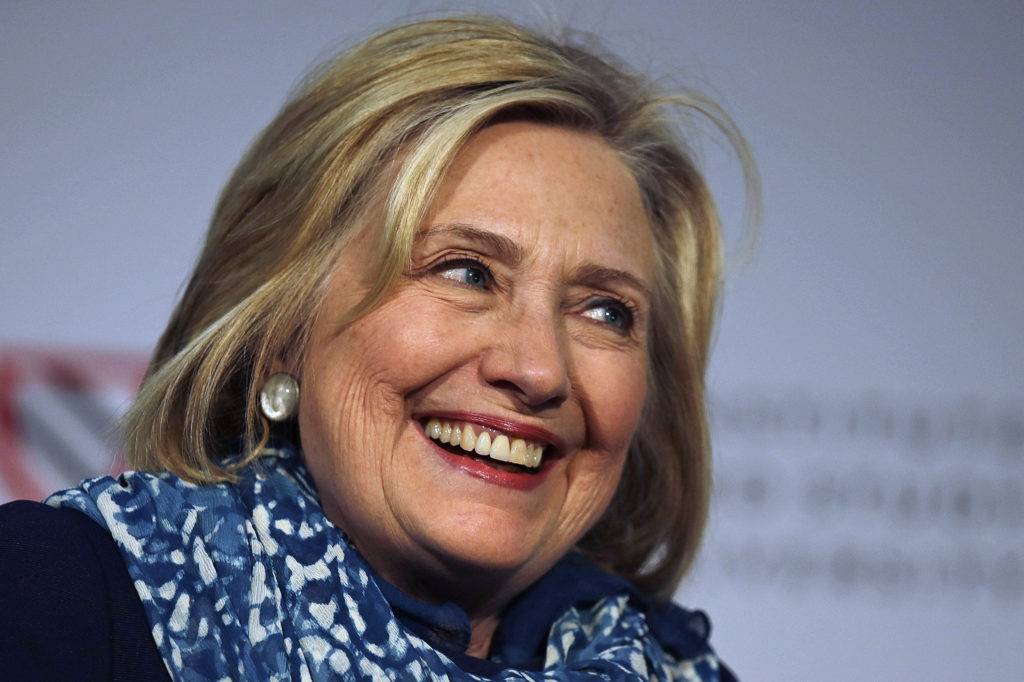
The State Department has completed its internal investigation into former Secretary of State Hillary Clinton’s use of private email and found violations by 38 people, some of whom may face disciplinary action. The investigation, launched more than three years ago, determined that those 38 people were “culpable” in 91 cases of sending classified information that ended up in Clinton’s personal email, according to a letter sent to Republican Sen. Chuck Grassley this week. The 38 are current and former State Department officials but were not identified. The investigation covered 33,000 emails that Clinton turned over for review after her use of the private email account became public. The department said it found a total of 588 violations involving information then or now deemed to be classified, but could not assign fault in 497 cases. For current and former officials, culpability means the violations will be noted in their files and will be considered when they apply for or go to renew security clearances. For current officials, there could also be some kind of disciplinary action. But it wasn’t immediately clear what that would be. The department began the review in 2016 after declaring 22 emails from Clinton’s private server to be “top secret.” Clinton was then running for president against Donald Trump, and the now-president made the server a major focus of his campaign. Then-FBI Director James Comey held a news conference that year in which he criticized Clinton as “extremely careless” in her use of the private email server as secretary of state but said the FBI would not recommend charges. The Justice Department’s inspector general said FBI specialists did not find evidence that the server had been hacked, with one forensics agent saying he felt “fairly confident that there wasn’t an intrusion.” Grassley started investigating Clinton’s email server in 2017, when he was chairman of the Senate Judiciary Committee. The Iowa Republican has been critical of Clinton’s handling of classified information and urged administrative sanctions. By Matthew Lee and Mary Clare Jalonick Associated Press Republished with the permission of the Associated Press
Donald Trump Jr. on Capitol Hill for closed-door Senate interview
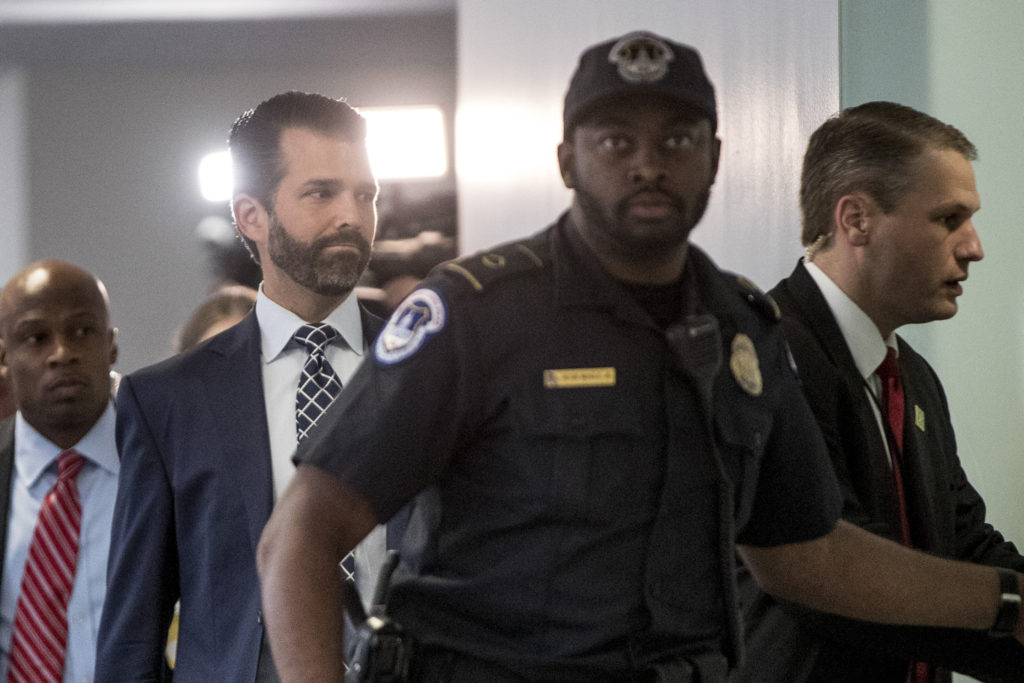
President Donald Trump’s eldest son told reporters he has “nothing to correct” as he arrived on Capitol Hill Wednesday for a second closed-door interview with the Senate intelligence committee. Donald Trump Jr. made the brief comments in response to a reporter who asked if he had come to correct his testimony. Senators want to discuss answers Trump Jr. gave the panel’s staff in a 2017 interview, as well as answers he gave to the Senate Judiciary Committee in a separate interview behind closed doors that year. He is appearing in response to a subpoena from the panel’s Republican chairman, North Carolina Sen. Richard Burr. President Trump’s former lawyer, Michael Cohen , told a House committee in February that he had briefed Trump Jr. approximately 10 times about a plan to build a Trump Tower in Moscow before the presidential election. But Trump Jr. told the Judiciary panel he was only “peripherally aware” of the real estate proposal. The panel is interested in talking to Trump Jr. about other topics as well, including a campaign meeting in Trump Tower with a Russian lawyer that captured the interest of special counsel Robert Mueller. Emails leading up to the meeting promised dirt on Democrat Hillary Clinton, Trump’s opponent. Mueller’s report, released in April, examined the meeting but found insufficient evidence to charge anyone with a crime. Trump Jr.’s testimony comes as the intelligence panel continues its two-year investigation of Russian interference in the 2016 election. Some Republicans are becoming restless with the topic, and Burr received considerable blowback from colleagues over the subpoena. But he told fellow senators that Trump Jr. had backed out of an interview twice, forcing the committee to act. The president said in May he believed that his son was being treated poorly.“It’s really a tough situation because my son spent, I guess, over 20 hours testifying about something that Mueller said was 100 percent OK and now they want him to testify again,” Trump told reporters at the White House. “I don’t know why. I have no idea why. But it seems very unfair to me.” It was the first known subpoena of a member of the president’s immediate family, and some Republicans went so far as to suggest Trump Jr. shouldn’t comply. Burr’s home state colleague, Sen. Thom Tillis, Republican-North Carolina, tweeted, “It’s time to move on & start focusing on issues that matter to Americans.” Sen. John Cornyn of Texas, a GOP member of the panel, said he understood Trump Jr.’s frustration. Cornyn’s Texas colleague, Republican Sen. Ted Cruz, said there was “no need” for the subpoena. Senate Majority Leader Mitch McConnell has defended Burr, saying “none of us tell Chairman Burr how to run his committee.” Still, McConnell made it clear that he is eager to be finished with the probe, which has now gone on for more than two years. It’s uncertain when the intelligence panel will issue a final report. Burr told The Associated Press last month that he hopes to be finished with the investigation by the end of the year. By Mary Clare Jalonick and Padmananda Rama Associated Press Republished with the permission of the Associated Press.
Senate Judiciary Committee advances Brett Kavanaugh nomination, Jeff Flake calls for delay on floor vote
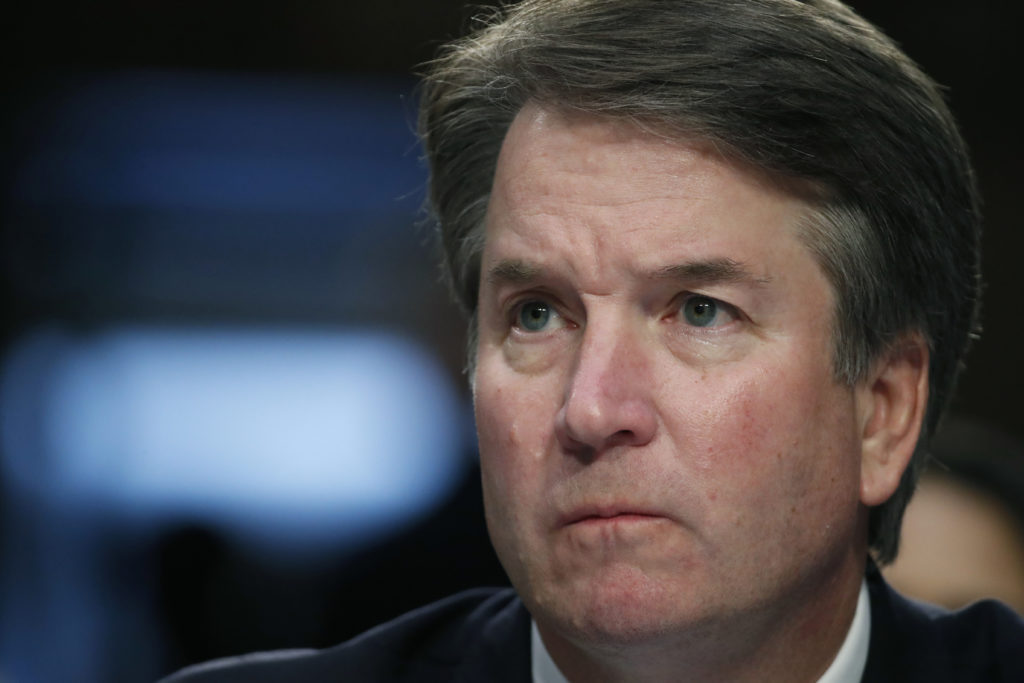
The Senate Judiciary Committee on Friday voted along party lines, 11-10, to advance the vote on Supreme Court nominee Brett Kavanaugh to the floor of the U.S. Senate for a vote. Seconds before casting his vote in favor of advancing Kavanaugh’s confirmation, Sen. Jeff Flake, made a dramatic move saying his final vote for or against Kavanaugh would be contingent on the FBI conducting an investigation into the accusations. “I think it would be proper to delay the floor vote for up to, but not more than, one week, in order to let the FBI to do an investigation, limited in time and scope to the current allegations that are there,” Flake said before casting his vote for Kavanaugh in the committee. “I think that we ought to do what we can to make sure that we do all due diligence with a nomination this important. This country is being ripped apart here. We’ve got to make sure that we do due diligence.” Republicans can afford to lose no more than two of their 51 members on the floor to confirm Kavanaugh, making Flake’s comment all the more important. Kavanaugh’s confirmation process has become complicated over the past two weeks after Dr. Christine Blasey Ford, a psychology professor in Northern California, said Kavanaugh tried to “attack [her]and remove [her]clothing” during a party when both of them were high school students in Maryland in the early 80s. Since that time two more women have made accusations against Kavanaugh. Ford said she is “100 percent” certain Kavanaugh attacked her. Meanwhile, he continues to call the allegations “completely false.” It is unclear what Senate Republican Leadership will do in response to Flake’s request for further investigation. This story is developing. Please check back for updates.
Make-or-break Senate hearing day for Brett Kavanaugh, accuser

With high drama in the making, Supreme Court nominee Brett Kavanaugh emphatically fended off new accusations of sexual misconduct Wednesday and headed into a charged public Senate hearing that could determine whether Republicans can salvage his nomination and enshrine a high court conservative majority. The Senate Judiciary Committee — 11 Republicans, all men, and 10 Democrats — was to hear from just two witnesses on Thursday: Kavanaugh, a federal appeals court judge who has long been eyed for the Supreme Court, and Christine Blasey Ford, a California psychology professor who accuses him of attempting to rape her when they were teens. Republicans have derided her allegation as part of a smear campaign and a Democratic plot to sink Kavanaugh’s nomination. But after more allegations have emerged, some GOP senators have allowed that much is riding on Kavanaugh’s performance. Even President Donald Trump, who nominated Kavanaugh and fiercely defends him, said he was “open to changing my mind.” “I want to watch, I want to see,” he said at a news conference in New York. Kavanaugh himself has repeatedly denied all the allegations, saying he’d never even heard of the latest accuser and calling her accusations “ridiculous and from the Twilight Zone.” The hearing will be the first time the country sees and hears from the 51-year-old Ford beyond the grainy photo that has been flashed on television in the 10 days since she came forward with her contention. In testimony released in advance of the hearing, she said she was appearing only because she felt it was her duty, was frankly “terrified” and has been the target of vile harassment and even death threats. “It is not my responsibility to determine whether Mr. Kavanaugh deserves to sit on the Supreme Court,” she was to tell the senators. “My responsibility is to tell the truth.” The stakes for both political parties — and the country — are high. Republicans are pushing to seat Kavanaugh before the November midterms, when Senate control could fall to the Democrats and a replacement Trump nominee could have even greater difficulty. Kavanaugh’s ascendance to the high court could help lock in a conservative majority for a generation, shaping dozens of rulings on abortion, regulation, the environment and more. But Republicans also risk rejection by female voters in November if they are seen as not fully respecting women and their allegations. In the hours before the hearing, Republicans were rocked by the new accusation from a third woman, Julie Swetnick. In a sworn statement, she said she witnessed Kavanaugh “consistently engage in excessive drinking and inappropriate contact of a sexual nature with women in the early 1980s.” Her attorney, Michael Avenatti, who also represents a porn actress who is suing Trump, provided her sworn declaration to the Judiciary Committee. Meanwhile, the lawyer for Deborah Ramirez, who says Kavanaugh exposed himself to her at a party when they attended Yale University, raised her profile in a round of television interviews. Transcripts of private interviews with committee investigators, released late Wednesday, show they also asked Kavanaugh about two other previously undisclosed accusations received by Senate offices. One came in an anonymous letter sent to Sen. Cory Gardner‘s office describing an incident in a bar in 1998, when Kavanaugh was working for the independent counsel investigating President Bill Clinton. The other accused Kavanaugh of sexual misconduct in college. Kavanaugh denied them both. Republicans largely expressed confidence in Kavanaugh ahead of the hearing, emerging from a closed-door lunch with Vice President Mike Pence to say the nominee remains on track for confirmation. Senate Majority Leader Mitch McConnell all week has said Republicans will turn to a committee vote on Kavanaugh after the hearing. They hope for a roll call by the full Senate — where they have a scant 51-49 majority — early next week with the aim of getting him on the court as its new term begins. But at least a hint of doubt has crept in. Asked whether there were signs of Republicans wavering in their support of Kavanaugh in their lunch, Sen. John Thune, the third-ranking Republican, paused briefly before saying “no.” In the hearing, Democrats plan to ask Kavanaugh if he’d be willing to undergo FBI questioning about the various claims — a request Republicans oppose— and press him about his drinking and behavior as a teenager. One goal is to emphasize inconsistencies in his statements so far and make him appear nervous, said a Democratic aide who described the plan on condition of anonymity because he wasn’t authorized to discuss it publicly. Questions for Ford will be aimed at giving her a chance to explain herself. That includes describing why it took her so long to publicly discuss the alleged incident and how it’s affected her life, the aide said Ford will testify first at the hearing, which starts at 10 a.m. and at her request is being held in a small, wood-paneled hearing room that seats only a few dozen spectators. Republicans have hired an outside attorney, Phoenix prosecutor Rachel Mitchell, to handle much of their questioning. Thus, they will avoid having their all-male contingent interrogating Ford about the details of what she describes as a harrowing assault. Democratic questioners will include two senators widely seen as potential presidential candidates in 2020: Kamala Harris of California and Cory Booker of New Jersey, who aggressively challenged Kavanaugh during the judge’s earlier confirmation hearing. Ford plans to tell the committee that, one night in the summer of 1982, a drunken Kavanaugh forced her down on a bed, “groped me and tried to take off my clothes,” then clamped his hand over her mouth when she tried to scream before she was able to escape. “I believed he was going to rape me,” she will say, according to her prepared testimony. Kavanaugh is being challenged on multiple fronts by his accusers, former classmates and college friends. They say the good-guy image he projects in public bears little relation to the hard-partying behavior they witnessed when he
Brett Kavanaugh’s accuser wants FBI probe before she testifies
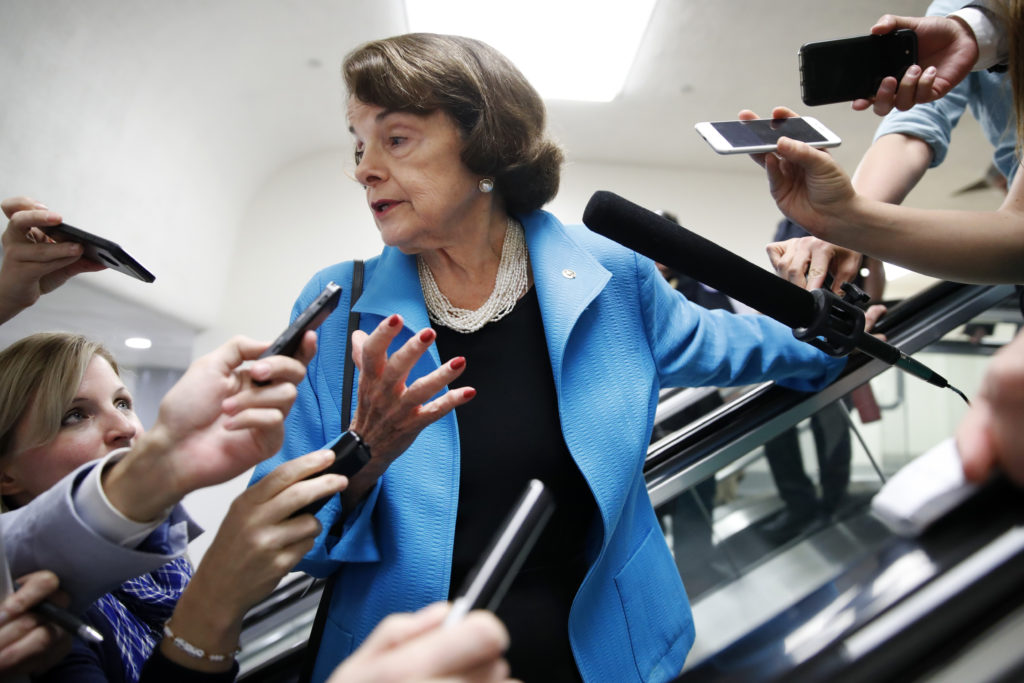
Christine Blasey Ford wants the FBI to investigate her allegation that she was sexually assaulted by Supreme Court nominee Brett Kavanaugh before she testifies at a Senate Judiciary Committee hearing next week, her lawyers said in a letter sent Tuesday to the panel. The lawyers wrote that Ford, who is now a college professor in California, wants to cooperate with the committee. But in the days since she publicly accused Kavanaugh of the assault when they were teens at a party 35 years ago, the lawyers said, she has been the target of “vicious harassment and even death threats.” Her family has relocated, they said. An FBI investigation “should be the first step in addressing the allegations,” the lawyers wrote in the letter, which was obtained by The Associated Press. The development comes after President Donald Trump showered sympathy on his embattled nominee and as Senate Republicans and Democrats fought determinedly over who should testify at a high-stakes hearing on the allegation just six weeks before major congressional elections. Trump has already rejected the idea of bringing in the FBI to reopen its background check of Kavanaugh. Should he order such a review, it would likely delay a confirmation vote until after the election. Republicans hope to have Kavanaugh confirmed by Oct. 1, the start of the next Supreme Court term. Meanwhile, Republicans are suggesting that Ford, whose allegations have upended Kavanaugh’s nomination — the committee’s vote was already pushed from Thursday to likely next week — will have one chance to testify, and one chance only. “Monday is her opportunity,” Senate Majority Leader Mitch McConnell, R-Ky., said Tuesday, a line that was echoed by other Republicans throughout the day. McConnell expressed confidence that Kavanaugh would be confirmed. “I’m not concerned about tanking the nomination,” he said. “We should proceed as planned,” said Sen. Orrin Hatch of Utah, a key Republican on the panel. The furious jockeying over Ford’s testimony underscores the political potency so close to an election that will decide control of both the House and Senate, not to mention the confirmation of a conservative justice likely to serve on the high court for decades. Democrats complain that Ford was not consulted before the hearing was announced. They also want more witnesses besides Kavanaugh and Ford, hoping to avoid what they said would turn into a “he-said-she-said” moment. The lawyers for Ford predicted the hearing, as now scheduled, “would include interrogation by senators who appear to have made up their minds” that she is “mistaken” and mixed up. But Democrats also said Tuesday they were planning to attend the hearing even if Ford did not show up. Sen. Dick Durbin, D-Ill., said he had “a lot of questions” for Kavanaugh. “A simple denial is not the end of questioning.” As Democrats press for more time to investigate, Republicans have been careful to say that Ford should have her chance to speak, and they have stressed that they are willing to move Monday’s hearing behind closed doors, if she prefers. “Were planning on a hearing Monday. It can be open. It can be closed, whatever Ms. Ford wants,” said Sen. John Kennedy, a member of the Judiciary panel from Louisiana. “We’re ready to hear anything she has to say. I am, anyway, and I think most of us are.” GOP Sen. Bob Corker of Tennessee — among a handful of Republicans who insisted on hearing from Ford before voting — said it would be a “shame” if Ford didn’t show up to testify. But he suggested Republicans will not bend from their offer of a hearing Monday. “That would be quite something if she decided she did not want to testify,” Corker said. “I’d assume the committee would then move on as they should.” One witness the Democrats want to hear from is Kavanaugh’s high school friend Mark Judge, who Ford said was in the room when she was assaulted. Kavanaugh has denied Ford’s allegation, and Judge says he doesn’t remember any such thing. “More to the point, I never saw Brett act in the manner Dr. Ford describes,” Judge said in a letter to the panel. The risks of a public hearing starring the all-male lineup of Republicans on the committee could be high. Republicans said late Tuesday they were considering hiring outside attorneys, presumably including women, to question the witnesses. But that may be moot if Ford declines to appear. Kavanaugh, 53, was at the White House on Tuesday for a second straight day, but again did not meet with Trump. The president said he was “totally supporting” Kavanaugh and felt “terribly” for him and his family. “I feel so badly for him that he’s going through this, to be honest with you, I feel so badly for him,” said Trump, who has himself faced numerous accusations of sexual harassment that he’s denied. “This is not a man that deserves this.” The No. 2 Senate Republican leader, John Cornyn of Texas, was one of the few Republicans who openly questioned Ford’s version of events. He called the allegations a “drive-by attack” on the judge’s character. “There are gaps in her memory,” Cornyn said. “She doesn’t know how she got there, when it was and so that would logically be something where she would get questions.” Criticism like that fed a Democratic narrative that the GOP’s handling of Ford could jeopardize that party’s election prospects in the age of #MeToo, the response to sexual abuse that has torched the careers of prominent men. “Now this is really what #MeToo is all about, if you think about it,” said Sen. Dianne Feinstein of California, the top Judiciary Committee Democrat. “That’s sort of the first thing that happens, it’s the woman’s fault. And it is not the woman’s fault.” Meanwhile, Kavanaugh has been calling Republican senators, including Kennedy, who said the nominee was committed to moving forward. “He’s not happy, he’s upset,” Kennedy said. “He said very clearly and unequivocally, ‘This did not happen.’” Ford went public with her
Doug Jones says he is keeping ‘open mind’ on Brett Kavanaugh
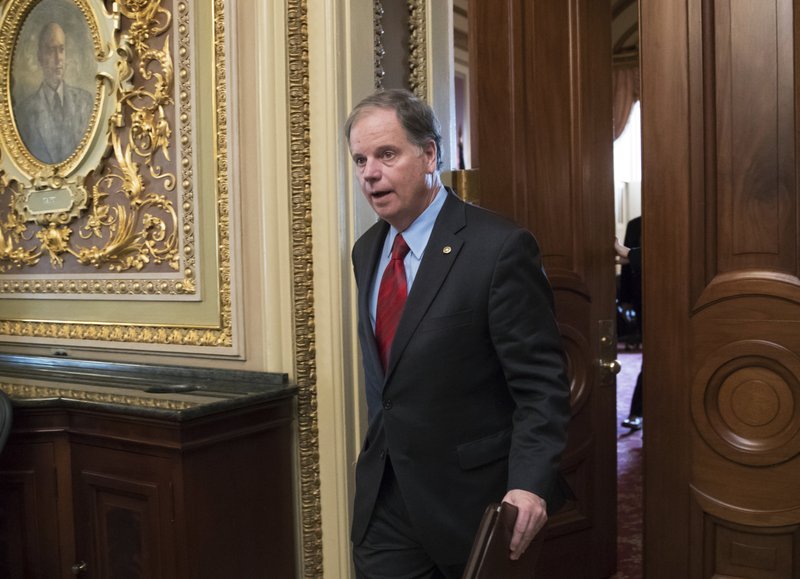
U.S. Sen. Doug Jones of Alabama said he is keeping an “open mind” on President Donald Trump’s Supreme Court nominee Brett Kavanaugh and is not worried about a flurry of advertising pressuring him to confirm or reject the nominee. The Democratic senator told reporters Friday evening that he wants to do his “due diligence” on Kavanaugh’s work. “I want to keep an open mind on every aspect of it and look at a number of different things,” Jones said. Jones said the one concern he has is getting documents out of the White House. Democrats have asked to see records from Kavanaugh’s time there as White House staff secretary to President George W. Bush. With past nominees, everything was “turned over” unless there was a technical reason that it should be privileged, Jones said. “We need the information out of the White House,” Jones said. “We didn’t nominate him. The President did. He nominated him with a full knowing of his background. I would like to see them just say, ‘Look, OK, we will get this to you.’” The conservative Judicial Crisis Network has launched advertising in Alabama pressuring Jones, a Democrat in a red-leaning state, to confirm Kavanaugh, saying the vote “will show who Doug Jones really is.” Jones said he was not concerned about the advertising. “I’m not worried about the ads. I tell folks, ‘Ads on both sides, they are really wasting their money.’ I have a process I’m going through to do what I think is my job and ads from interest groups really don’t mean that much to me at all,” Jones said. After graduating law school in 1979, Jones worked for the Senate Judiciary Committee during his time as a staffer to the late Sen. Howell Heflin. He said the process today is “much, much, much, much more political” and partisan. “That’s very unfortunate. The framers of the Constitution wrote in an independent judiciary. And it’s hard to see how a Supreme Court is considered independent when you see so much money spent on advertising to get 51 votes,” Jones said. Republished with the permission of the Associated Press.
Jeff Sessions defends James Comey firing, ties it to Hillary Clinton email case
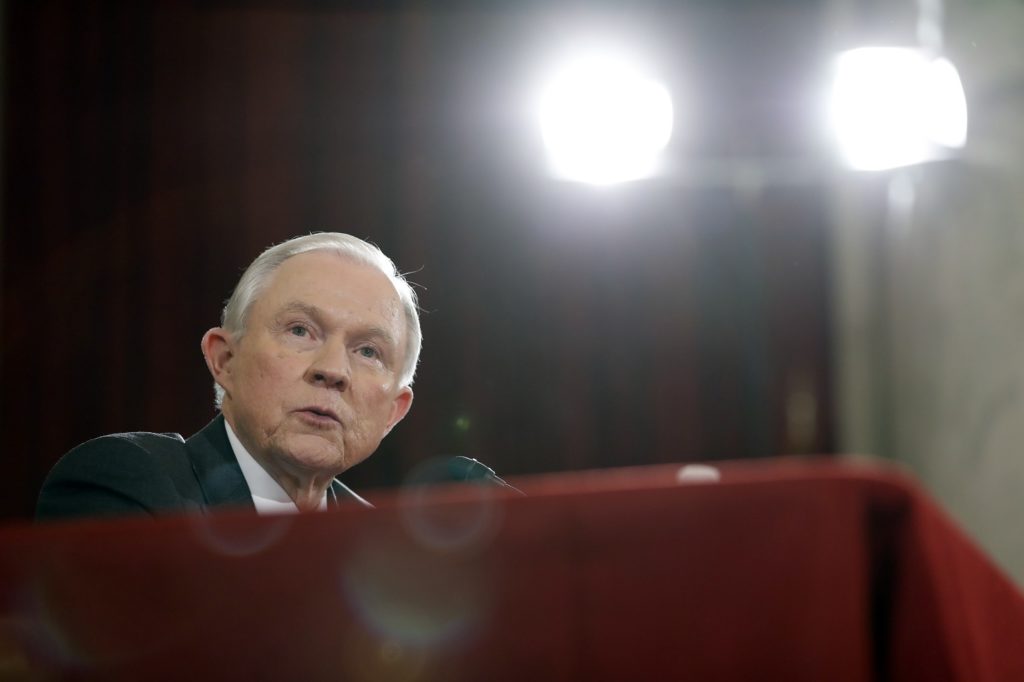
Attorney General Jeff Sessions on Wednesday strongly defended President Donald Trump‘s firing of James Comey, linking the FBI director’s abrupt dismissal to his handling of the Hillary Clinton email server investigation. But he refused to discuss any private conversations he had with the president leading up to Comey’s firing and would not say if he had discussed with the president an FBI investigation into potential coordination between Russia and the Trump campaign. Sessions, appearing before the Senate Judiciary Committee, said it was “the first time I’m aware of” in which an FBI director had performed the traditional role of Justice Department prosecutors by announcing on his own the conclusion of a federal investigation – that no charges would be brought against Clinton. He said he was further galled when Comey, one week before his firing, insisted to Congress that he would have taken the same actions again. Sessions’ insistence that Comey’s firing was motivated by displeasure over the Clinton email case is consistent with the initial White House explanation. But Trump himself has at times appeared to undercut that explanation, saying he would have fired Comey even without the recommendation of the Justice Department and that he was thinking of “this Russia thing” when he dismissed him on May 9. Trump has accused Comey of having prematurely exonerated Clinton, even though the Justice Department’s own explanation for the firing cited his decision to effectively reopen the probe days before the November election. The FBI’s investigation is now being run by the Justice Department’s special counsel, Robert Mueller. After initially balking at the question, Sessions said that he had not been questioned by Mueller’s team of investigators. He has been seen as a possible witness in the case given his involvement in the firing of Comey. Sessions stressed at the outset that he would not discuss any private conversations with the president and he largely abided by that principle, deflecting questions not only about the Russia investigation but also about the president’s pardon of Sheriff Joe Arpaio, among other topics. The Russia probe has shadowed much of Sessions’ tenure as attorney general, even though he recused himself in March because of his role as a stanch Trump campaign ally. It was a central focus the oversight hearing, too, as lawmakers repeatedly pressed Sessions about his contacts with the former Russian ambassador to the U.S., his discussions with Trump about the investigation and his involvement in the firing of Comey. Though he refused to say whether he discussed with Trump Comey’s involvement in the Russia investigation, or his private conversations with Trump, Sessions did say that the president had asked him and Deputy Attorney General Rod Rosenstein for their recommendations about what to do with Comey. “He did ask for our written opinion and we submitted that to him,” Sessions said under questioning from Sen. Dianne Feinstein of California, the committee’s top Democrat. “It did not represent any change in either one of ours opinions.” The routine oversight hearing is Sessions’ first before the committee since his January confirmation, and it comes as has worked quickly to reshape the department with an intense focus on immigration, drugs, gangs and violent crime. He also faced questions from lawmakers about his swift undoing of Obama-era protections for gay and transgender people and his rollback of criminal justice policies that aimed to reduce the federal prison population, among other changes he has made in nine months since taking office. Sessions has tried to pressure so-called sanctuary cities into cooperating with federal immigration authorities by threatening to withhold grant money, and he was the public face of the Trump administration’s decision to end a program benefiting hundreds of thousands of young people who entered the U.S. illegally as children. Congress is seeking a legislative solution to extend the protections before recipients’ work permits expire. It is standard policy for attorneys general to appear each year before the Justice Department’s congressional overseers on the House and Senate judiciary committees. Yet, in a reflection of the extent to which the Russia investigation and his own role as a Trump campaign ally have dominated public attention, Sessions made his first appearance on Capitol Hill as attorney general before the Senate Intelligence Committee. Democratic senators have already made clear they want Sessions to detail his private conversations with Trump, particularly in the run-up to the Comey’s firing, or announce that Trump is invoking executive privilege to protect those communications. Sessions repeatedly refused to discuss his talks with Trump during his three-hour appearance before the Senate intelligence panel. He did not say he was using executive privilege, but rather adhering to longstanding tradition of Justice Department leaders to refrain from revealing the contents of private conversations with the president. That explanation left many Democrats unsatisfied and is unlikely to put to an end demands for detailed accounts of those conversations. Republished with permission from the Associated Press.
Bipartisan Senate bill aims to protect special counsel’s job

Two members of the Senate Judiciary Committee are moving to protect Special Counsel Robert Mueller‘s job, putting forth new legislation that aims to ensure the integrity of current and future independent investigations. Republican Sen. Thom Tillis of North Carolina and Democratic Sen. Chris Coons of Delaware plan to introduce the legislation Thursday. The bill would allow any special counsel for the Department of Justice to challenge his or her removal in court, with a review by a three-judge panel within 14 days of the challenge. The bill would be retroactive to May 17, 2017 — the day Mueller was appointed by Deputy Attorney General Rod Rosenstein to investigate Russian meddling in the 2016 election and possible ties to Donald Trump‘s campaign. “It is critical that special counsels have the independence and resources they need to lead investigations,” Tillis said in a statement. “A back-end judicial review process to prevent unmerited removals of special counsels not only helps to ensure their investigatory independence, but also reaffirms our nation’s system of check and balances.” Mueller was appointed as special counsel in May following Trump’s abrupt firing of FBI Director James Comey. Mueller, who was Comey’s predecessor as FBI director, has assembled a team of prosecutors and lawyers with experience in financial fraud, national security and organized crimes to investigate contacts between Moscow and the Trump campaign. Trump has been critical of Mueller since his appointment, and his legal team is looking into potential conflicts surrounding the team Mueller has hired, including the backgrounds of members and political contributions by some members to Hillary Clinton. He has also publicly warned Mueller that he would be out of bounds if he dug into the Trump family’s finances. Mueller has strong support on Capitol Hill. Senators in both parties have expressed concerns that Trump may try to fire Mueller and have warned him not to do so. “Ensuring that the special counsel cannot be removed improperly is critical to the integrity of his investigation,” Coons said. Republican Sen. Lindsey Graham of South Carolina, another member of the Judiciary panel, said last week that he was working on a similar bill that would prevent the firing of a special counsel without judicial review. Graham said then that firing Mueller “would precipitate a firestorm that would be unprecedented in proportions.” The Tillis and Coons bill would allow review after the special counsel had been dismissed. If the panel found there was no good cause for the counsel’s removal, the person would be immediately reinstated. The legislation would also codify existing Justice Department regulations that a special counsel can only be removed for misconduct, dereliction of duty, incapacity, conflict of interest or other good cause, such as a violation of departmental policies. In addition, only the attorney general or the most senior Justice Department official in charge of the matter could fire the special counsel. In the case of the current investigation, Rosenstein is charged with Mueller’s fate because Attorney General Jeff Sessions recused himself from all matters having to do with the Trump-Russia investigation. Republished with permission of The Associated Press.
Lawmakers OK subpoena power in impeachment cases
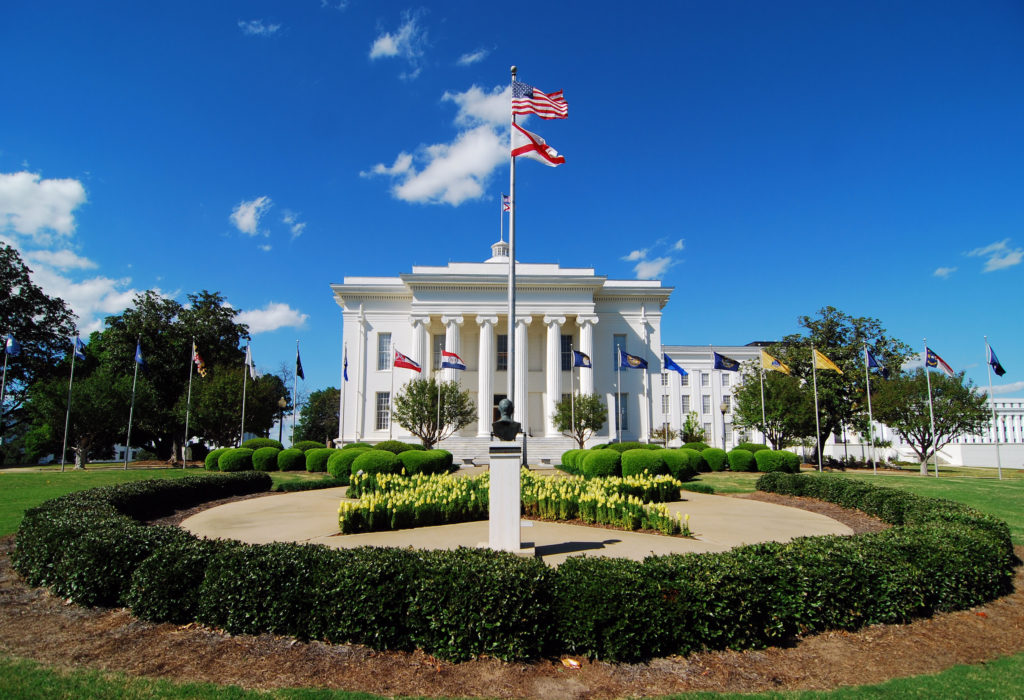
The next time an Alabama official faces impeachment, some lawmakers want the Legislature to have subpoena power — a question that wasn’t entirely clear during the recent investigation of former Gov. Robert Bentley. The Senate Judiciary Committee voted without dissent Wednesday to let lawmakers issue legally-enforceable subpoenas during impeachment proceedings. They’re trying to close a loophole that allowed former Bentley to avoid complying with a legislative investigation into whether he committed offenses that warranted his removal from office. The Senate bill’s sponsor said lawmakers could issue subpoenas in their investigation of Bentley but had no means to enforce their requests for documents or interviews. “Perhaps we could have issued a subpoena but someone could just as easily look at us and go ‘I don’t intend to do that,’” said Sen. Phil Williams, a Gadsden Republican. “And that could leave the proceedings somewhat feckless.” Lawmakers gave special counsel Jack Sharman subpoena power in an impeachment probe into the former governor but his subsequent report showed that Bentley and many other people refused to participate in the investigation. In an interview, Sharman said it’s “a good idea” to clarify lawmaker’s abilities during impeachment investigations. “There’s certainly good reason to make this explicit,” he said. “The governor has a constitutional duty to respond to the Legislature.” Bentley resigned Monday after pleading guilty to two misdemeanors related to campaign finance violations that came to light during an investigation of his alleged affair with a top aide. The bill now moves to the full Senate for a vote. Republished with permission of The Associated Press.
Darryl Paulson: On Neil Gorsuch; both parties should just grow up!
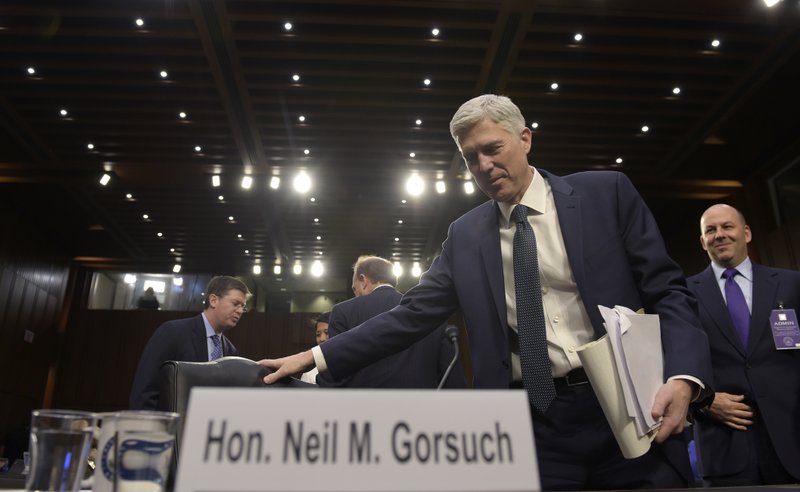
Until 1987, presidential nominees to the U.S. Supreme Court were respectfully received and reviewed by the U.S. Senate. In 1986, Antonin Scalia, a judicial conservative and constitutional originalist, was nominated by President Ronald Reagan to a vacancy on the court. He was confirmed 98 to 0 by the U.S. Senate. The confirmation process imploded in 1987 when another Reagan nominee to the court, Robert Bork, was subject to such a vicious attack concerning his record and judicial temperament, that the word “borking” became part of the political lexicon. To be “borked” was to be the subject of a public character assassination. Since the defeat of Judge Bork in 1987, the confirmation process for Supreme Court nominees has become bitter and brutal. In 2016, President Barack Obama nominated the highly-qualified jurist Merrick Garland to fill the vacancy due to the death of Scalia. The Republican-controlled Senate refused to hold hearings on the Garland nomination, arguing that it should be left to the next president. Democrats were outraged by the treatment of Garland and are taking out their anger by attempting to defeat President Donald Trump‘s nomination of Neil Gorsuch. Democrats contend that Gorsuch’s views are out of the mainstream and accuse him of favoring corporations over workers. They also argue that he fails to fully defend the right to vote and favors the “powerful candidate interests over the rights of all Americans.” Republicans respond by asking how, if Gorsuch’s views were so extreme, did he win confirmation on a 98 to 0 vote 10 years ago, when he was seated on the 10th Circuit Court of Appeals in Denver, Colorado. Would not some of those senators have opposed his extreme views when first nominated? Not only that, but the American Bar Association (ABA) told the Senate Judiciary Committee that Judge Gorsuch received its “well qualified” rating, the highest rating available from the ABA. Nancy Scott Dogan of the ABA said, “We do not give the “well qualified” rating lightly.” So, why does the ABA see Judge Gorsuch in such a different light than Democrats in the Senate? Republicans want to confirm Gorsuch for several reasons. With the death of Justice Scalia, Gorsuch would likely carry on his conservative views. For quite some time, the court has been divided between four conservatives, four liberals and the swing vote of Justice Kennedy. The Republicans and Trump also need a political victory. The Republican failure to “repeal and replace” Obamacare was a deep political blow to the party and its president. President Trump, who promised his supporters that they would “get tired of winning,” are beginning to wonder what happened to all those promised wins. Democrats want to defeat Gorsuch as political payback for the treatment of Garland, and also to make amends for Trump’s surprise victory over Hillary Clinton. In addition, Democrats want a second major defeat of Trump after he failed to secure passage of the Republican health care plan. Democratic activists do not want their elective officials to give 1 inch to the Republicans. In 2005, the “Gang of 14” senators from both parties reached an agreement to prevent an impasse over judicial nominations. The filibuster and 60 vote requirement would continue for Supreme Court nominees, but a simple majority would be needed for other nominations. Since Republican outnumber Democrats 52 to 48 in the Senate, eight Democrats must support Gorsuch for him to be confirmed. So far, no Democrat has indicated support for Gorsuch. As a result, Republican Majority Leader Mitch McConnell is threatening to use the “nuclear option.” The “nuclear option” would allow the Senate to approve a change in the filibuster rule to require a simple majority of the Senate, or 51 votes, to confirm a Supreme Court appointee. To change the filibuster rules only requires 51 votes. If Democrats are successful in their filibuster against Gorsuch, it will be the first successful filibuster of a Supreme Court nominee in over 50 years when the Senate rejected President Lyndon Johnson‘s selection of Abe Fortas to be Chief Justice. According to Republican Sen. Lindsey Graham of South Carolina, a successful Democratic filibuster would mean “that qualifications no longer matter.” A candidate unanimously confirmed to the Court of Appeals a decade ago and one who has received the highest rating from the ABA is not suitable for the court. Republican Sen. Susan Collins of Maine, one of only three senators still left who brokered the “Gang of 14” deal, is keeping the door open to use the nuclear option. As a firm believer in the rules and traditions of the Senate, Collins argues that “it would be unfair if we cannot get a straight up-or-down vote on Judge Gorsuch.” But then, it was only a year ago, that Obama and the Democrats were making the same argument on behalf of Merrick Garland. If only one of the two parties could grow up! ___ Darryl Paulson is Emeritus Professor of Government at USF St. Petersburg.
Senate committee approves Jeff Sessions’ AG nomination in party-line vote
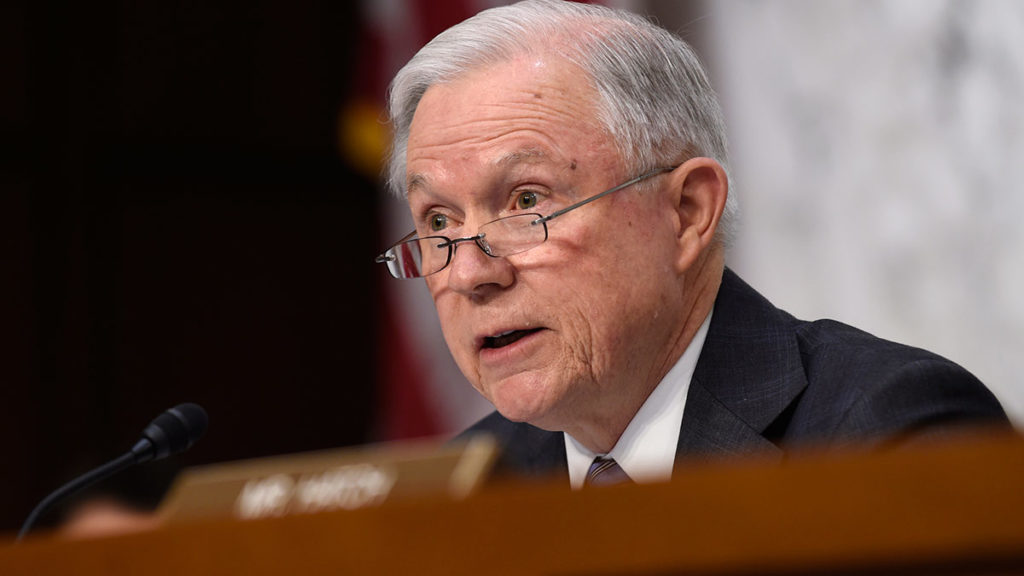
Alabama-Republican Sen. Jeff Sessions cleared another major hurdle on Wednesday, moving one step closer to becoming the nation’s next attorney general, when the Senate Judiciary Committee approved his nomination on a party-line vote. The 11-9 decision now moves to the Senate floor confirmation, where he is widely expected to be confirmed given the GOP’s 52-seat majority. To date, none of his Republican colleagues have voiced opposition to him nomination and he has the vote of at least one Democrat — West Virginia-Democrat Sen. Joe Manchin. Upon full chamber confirmation, Sessions is poised to take over as the nation’s chief law enforcement officer, a post which is now vacant following President Donald Trump‘s late-night firing of acting Attorney General Sally Yates on Monday.
After Donald Trump’s immigration order, new scrutiny rises over Jeff Sessions AG confirmation

A news coverage roundup of Jeff Sessions’ upcoming attorney general confirmation hearing in the wake of Donald Trump’s executive order temporarily banning immigration from seven Middle East and African nations, The Alabama Senator faces a vote Tuesday by the Senate Judiciary Committee, a day after the president dismissed Acting Attorney General Sally Yates after she questioned the legality of his immigration directive. The Huffington Post — What was Jeff Sessions’ role in Donald Trump’s immigration order? Amid growing evidence that the Trump administration rushed into a legally- and constitutionally-shaky ban on immigration from seven Middle East and African nations, the U.S. Senate is about to rush to judgment on the president’s top legal adviser, Sen. Jeff Sessions of Alabama. That would be a mistake. And thankfully, it’s one the Senate can still avoid. With a vote scheduled Tuesday morning in the Senate Judiciary Committee on Sessions’ nomination, Chairman Charles Grassley should order a new hearing and a delay in voting so that senators can learn what role Sessions played in drafting the immigration ban and ascertain his views on its legality and constitutionality. The Washington Post — Donald Trump’s hard-line actions have an intellectual godfather: Jeff Sessions The early days of the Trump presidency have rushed a nationalist agenda long on the fringes of American life into action — and Sessions, the quiet Alabamian who long cultivated those ideas as a Senate backbencher, has become a singular power in this new Washington. Sessions’s ideology is driven by a visceral aversion to what he calls “soulless globalism,” a term used on the extreme right to convey a perceived threat to the United States from free trade, international alliances and the immigration of nonwhites. And despite many reservations among Republicans about that worldview, Sessions — whose 1986 nomination for a federal judgeship was doomed by accusations of racism that he denied — is finding little resistance in Congress to his proposed role as Trump’s attorney general. GQ — Senate Democrats should not vote to confirm Jeff Sessions While you were sitting down to dinner last night, President Trump ignited this country’s most significant constitutional crisis since Nixon‘s Saturday Night Massacre, firing Acting Attorney General Sally Yates after she issued a one-page letter opining that President Trump’s Muslim ban is unlawful and ordering Department of Justice attorneys not to defend it in court. This morning, the Senate Judiciary Committee is set to vote on the nomination of the ban’s “intellectual godfather,” Alabama Senator and genteel racist Jeff Sessions, to the position of Attorney General — the very position from which Yates was fired for voicing her opinion on the ban less than 24 hours ago … With Sessions revealed as the ideological heavyweight behind the ban, Yates’s letter suddenly transformed Tuesday’s Judiciary Committee confirmation vote into a litmus test of just how much lawmakers who claim to oppose that ban actually mean it. AL.com — Will Jeff Sessions still be confirmed as Donald Trump AG despite outcry over immigration ban? Tuesday morning’s confirmation hearing for Jeff Sessions, President Donald’s nominee for U.S. Attorney General, will be the first time Sessions has spoken publicly since Trump issued an executive order last week that imposed sweeping restrictions on immigrants and refugees from seven Muslim-majority countries. The nomination of the former U.S. Senator from Alabama is one of the most contentious of Trump’s cabinet picks, with Democrats, civil rights organizations and immigrant advocates lambasting his long history of policies and actions they describe as racist, divisive and unjust. Despite strong opposition from the left, there is something of a consensus among many political experts, professors, lawyers and pundits that the Sessions is all but guaranteed to ultimately be approved for America’s top law enforcement position. Observers will be watching Tuesday to see if and how Democratic senators — and the handful of Republicans who have publicly criticized the immigration moves — will speak out against the executive orders during the hearing, or even vote against Sessions. CNN — Monday night massacre is a wake-up call to Senate Democrats Frustrated with a President who seems to be running roughshod over American policy, Acting Attorney General Sally Yates, an Obama appointee, announced she would not defend the order. Yates said she would refuse to put the power of the Department of Justice behind this measure in the courts. Human rights, civil rights, and civil liberties supporters were bolstered by her defiance. Then Trump fired her by a hand-delivered letter, revealing the fragility of the opposition to this administration. Even with this blowup, it still does not seem that the Republican Senate, eager to secure this moment of unified government, will do anything to jeopardize Senator Jeff Sessions’ confirmation as Attorney General. And from everything we know, Sessions will be much more than merely willing to enforce this order and anything else that comes from the Trump White House involving immigration and refugees in the coming years. Daily Mail — Donald Trump bashes Democrats for slow-walking Jeff Sessions nomination after he fires rebel deputy attorney general leftover from Obama era Trump unleashed his fury on Democrats this morning for holding up the confirmation of his attorney general, Alabama Senator Jeff Sessions. ‘When will the Democrats give us our Attorney General and rest of Cabinet! They should be ashamed of themselves! No wonder D.C. doesn’t work!’ he tweeted. Another message nicknamed a leading Democrat Senator ‘Fake Tears Chuck Schumer,’ building on a riff Trump delivered Monday in the Oval Office. Democrats have been taking advantage of Senate rules to slow votes on Trump’s cabinet appointees. NBC News — Attorney General nominee Jeff Sessions faces Senate committee vote amid DOJ turmoil Alabama Republican Sen. Jeff Sessions is poised to clear his first Senate hurdle Tuesday morning on his way to becoming head of the Department of Justice — a role thrown into sudden upheaval hours after the firing of the acting attorney general … Sen. Patrick Leahy of Vermont, the ranking Democrat on the committee, is leading a vote to block

